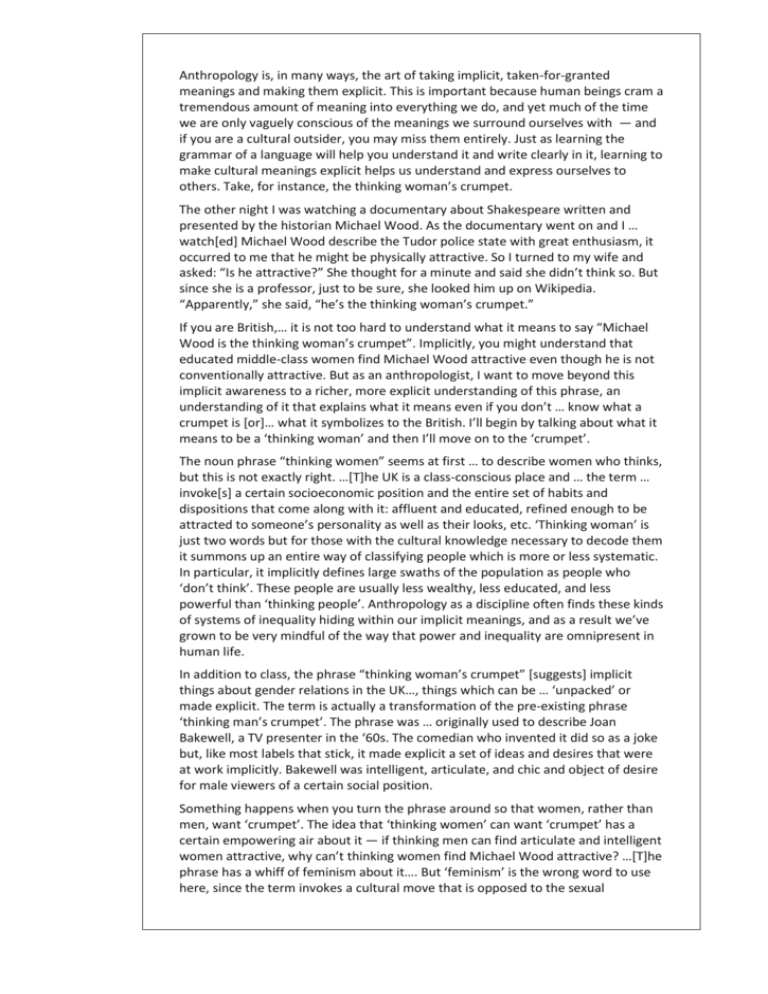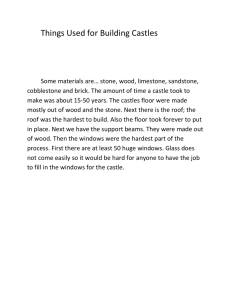File
advertisement

Anthropology is, in many ways, the art of taking implicit, taken-for-granted meanings and making them explicit. This is important because human beings cram a tremendous amount of meaning into everything we do, and yet much of the time we are only vaguely conscious of the meanings we surround ourselves with — and if you are a cultural outsider, you may miss them entirely. Just as learning the grammar of a language will help you understand it and write clearly in it, learning to make cultural meanings explicit helps us understand and express ourselves to others. Take, for instance, the thinking woman’s crumpet. The other night I was watching a documentary about Shakespeare written and presented by the historian Michael Wood. As the documentary went on and I … watch[ed] Michael Wood describe the Tudor police state with great enthusiasm, it occurred to me that he might be physically attractive. So I turned to my wife and asked: “Is he attractive?” She thought for a minute and said she didn’t think so. But since she is a professor, just to be sure, she looked him up on Wikipedia. “Apparently,” she said, “he’s the thinking woman’s crumpet.” If you are British,… it is not too hard to understand what it means to say “Michael Wood is the thinking woman’s crumpet”. Implicitly, you might understand that educated middle-class women find Michael Wood attractive even though he is not conventionally attractive. But as an anthropologist, I want to move beyond this implicit awareness to a richer, more explicit understanding of this phrase, an understanding of it that explains what it means even if you don’t … know what a crumpet is [or]… what it symbolizes to the British. I’ll begin by talking about what it means to be a ‘thinking woman’ and then I’ll move on to the ‘crumpet’. The noun phrase “thinking women” seems at first … to describe women who thinks, but this is not exactly right. …[T]he UK is a class-conscious place and … the term … invoke[s] a certain socioeconomic position and the entire set of habits and dispositions that come along with it: affluent and educated, refined enough to be attracted to someone’s personality as well as their looks, etc. ‘Thinking woman’ is just two words but for those with the cultural knowledge necessary to decode them it summons up an entire way of classifying people which is more or less systematic. In particular, it implicitly defines large swaths of the population as people who ‘don’t think’. These people are usually less wealthy, less educated, and less powerful than ‘thinking people’. Anthropology as a discipline often finds these kinds of systems of inequality hiding within our implicit meanings, and as a result we’ve grown to be very mindful of the way that power and inequality are omnipresent in human life. In addition to class, the phrase “thinking woman’s crumpet” [suggests] implicit things about gender relations in the UK…, things which can be … ‘unpacked’ or made explicit. The term is actually a transformation of the pre-existing phrase ‘thinking man’s crumpet’. The phrase was … originally used to describe Joan Bakewell, a TV presenter in the ‘60s. The comedian who invented it did so as a joke but, like most labels that stick, it made explicit a set of ideas and desires that were at work implicitly. Bakewell was intelligent, articulate, and chic and object of desire for male viewers of a certain social position. Something happens when you turn the phrase around so that women, rather than men, want ‘crumpet’. The idea that ‘thinking women’ can want ‘crumpet’ has a certain empowering air about it — if thinking men can find articulate and intelligent women attractive, why can’t thinking women find Michael Wood attractive? …[T]he phrase has a whiff of feminism about it…. But ‘feminism’ is the wrong word to use here, since the term invokes a cultural move that is opposed to the sexual objectification of women and other people. That ‘thinking woman’ can have ‘crumpet’ is an ‘empowering appropriation of the male gaze’. Or, in plainer English, women assert their equality with men by adopting male ways of looking at and finding people attractive, ways which in themselves might seem sexist.… … Let’s turn now to ‘crumpet’…. As we’ve seen, there are people like Michael Wood, who is a “thinking woman’s crumpets” and Joan Bakewell, who is a “thinking man’s crumpets”. But what is a plain, unmodified crumpet? …[A] crumpet is a griddle cake…. Americans may even be familiar with “English muffins” which are something like crumpets. Now we face the very common anthropological problem of people’s use of metaphor. Michael Wood, on the face of it, has almost nothing in common with crumpet. Crumpets are seven centimeters in diameter and Michael Wood is around six feet tall. Crumpets are inanimate, while Michael Wood moves under his own power and enthusiastically describes the Tudor police state. Crumpets are eaten by British people, but British people would consider completely disgusting the idea of killing and eating Michael Wood or Joan Bakewell or any other human. Or would they? Like many peoples, the British often draw metaphors between people and food, and in the metaphor hunger for the food is equated with sexual desire (an anthropologist would describe both of these as ‘appetitive longing’). Thus, for instance, a pastry shell filled with fruit called a ‘tart’ is often used as a metaphor for a sexually promiscuous woman. And in fact ‘crumpet’ is a term used to describe a certain kind of sexually attractive woman. …[T]he term originated in the 1930s with the rise of mass media…. It denoted scantily clad, voluptuous women whose appearance in movies and television was inappropriate but not actually pornographic. The pieces they appeared in were low-brow and down-market — vulgar and working class. Apparently men of the thinking class weren’t supposed to like that sort of crumpet. They preferred Joan Bakewell. … [C]alling a woman ‘crumpet’ evokes a wide range of associations: just as a crumpet is not a proper, nutritious meal, crumpets are not properly modest women; watching a crumpet on TV, like eating a crumpet, is a sort of cheap fulfillment — perhaps a guilty pleasure? Do working class people eat crumpet while upper class people eat some other sort of griddle cake? It’s hard to say. … [E]ven simple phrases like “thinking woman’s crumpet” contain within themselves incredible depth. Because they are part of a tightly interwoven and rich cultural system, understanding them requires that they be placed in their cultural context. In this case, this involves everything from British food to the class system to the history of mass media. At the same time, making the meanings of ‘thinking woman’s crumpet’ explicit makes cultural insiders see their own culture in a new way because it forces them to rethink what they used to take for granted — indeed, it may actually prompt some of them to learn about television shows and movies that have shaped their culture in ways they didn’t previously understand. Above all, unpacking the term ‘thinking woman’s crumpet’ allows us to take a look at how anthropologists interpret cultural materials. Excerpt adapted from anthropologist Dr Alex Golub’s “The Thinking Woman’s Crumpet” on savageminds.org (2012) Teenage Girl Blossoming Into Beautiful Object ARLINGTON, TX—Calling the transformation both delightful and stunning, friends and family members confirmed Tuesday that 17-year-old Ashley Parker was blossoming into an absolutely gorgeous object. According to Parker’s relatives, in the span of 14 months, the high school junior underwent a staggering metamorphosis from a young girl with thoughts, feelings, and aspirations into a truly stunning commodity. “Ashley has really developed into quite a striking assemblage of physical attributes that are found to be sexually attractive in our culture,” said Parker’s uncle Keith Hayes, expressing astonishment at how his niece had steadily matured from a precocious youth into a shapely, ravishing thing devoid of intellect and personality. “It’s hard to believe that she used to be that little girl [capable of subjective experiences] that I remember. Now look at her—she’s such a lovely vessel for displaced sexual frustration and voyeuristic lust, just like her mother.” “Seems like just yesterday she was this creative 7-year-old kid, pretending her Barbie was the first woman president,” Hayes added. “My, they grow into little more than consumer goods so quickly.” Marveling at the rite of passage that all females make from girlhood into entirely disempowered objecthood, Hayes expressed confidence that the 17-year-old would one day become a highly prized physical possession for “one lucky guy.” Parker’s classmates at Wakefield High School were also reportedly captivated by the adolescent’s transition from a young woman into an eye-catching repository for male gratification. High school senior Kevin Turner said that Parker had become a particularly alluring instrument of purely physical pleasure in the months since she was a young, conscious, independent preteen girl. “I grew up with Ashley and never thought much of her before, but over the last year or so, I really started to see her for the beautiful little piece of equipment she is,” said Turner, expressing enthusiasm for how the teen had evolved into a dazzling sexual apparatus. “I’m thinking of asking that mere receptacle to prom.” “Take a look at it,” added Turner of the former human being. “I can think of a lot of things I’d like to do with that.” Edmund Powell, Parker’s history teacher, echoed the sentiment of many pupils, claiming that he was impressed by the junior’s transformation from an honor roll student and sentient human being into a lovely piece of meat. “Ashley used to be one of the brightest and best students in my class,” said Powell, recalling the former girl who once consisted of more than a single, surface-deep dimension. “But, wow, now you’d have to say that she’s something very special. Something very special indeed.” While Parker’s mother Stacey was reportedly certain that her daughter would make a beautiful and unthinkingly gracious trophy someday, the 38-year-old cautioned Ashley not to get her hopes up about finding the perfect money bags right away. Adapted from The Onion (Jan 29, 2013)







